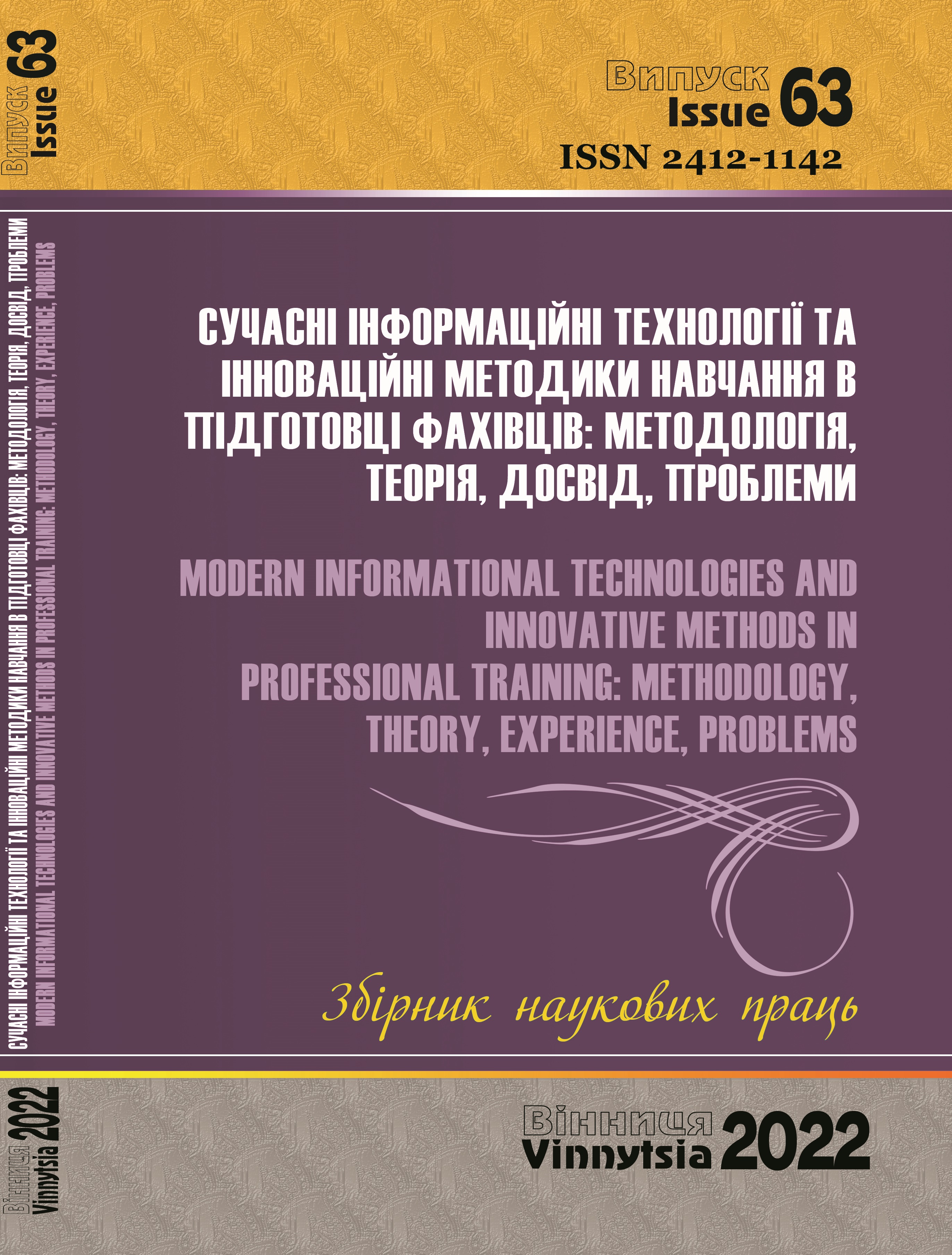FORMATION OF DIGITAL COMPETENCE OF FUTURE TEACHERS IN THE PROCESS OF STUDYING COMPUTER-ORIENTED LEARNING TECHNOLOGIES
DOI:
https://doi.org/10.31652/2412-1142-2022-63-5-19Keywords:
цифрова компетентність, комп’ютерно орієнтовані технології навчання, майбутній учитель, дистанційне навчання, інформаційне середовищеAbstract
Digital competence is recognized as one of the key to a full life and human activity and involves
confident, critical and responsible use of digital technologies and interaction with them in the process of
learning, work, daily life. The article analyzes approaches to defining the concept and content of digital
competence of teachers, regulations and framework documents on the basis of which modern approaches
to understanding and assessing the level of digital competence of future teachers, describes the list of
educational components of digital competence in curricula for future teachers. Vinnytsia State Mykhailo
Kotsyubynsky Pedagogical University, describes the methodological approaches and technological features
of teaching the discipline "Computer-based learning technologies" in the educational process during
quarantine restrictions and martial law using elements and technologies of distance learning, videos
recorded scientifically. pedagogical staff of the Department of Innovative and Information Technologies in
Education, the results of the analysis of the results of the effectiveness of the study of this discipline for 5
years under normal conditions, conditions of quarantine restrictions, mixed and distance learning, surveying
students on the need to study such a discipline, the feasibility of selected educational material, used
pedagogical technologies, methods of teaching and evaluating learning outcomes, the need and ability to
use acquired knowledge and skills in further educational and professional activities . The given materials
reflect the approach to the organization of educational activity in modern conditions with the use of e-
learning technologies formed in the educational institution.
Downloads
References
Council Recommendation of 22 May 2018 on key competences for lifelong learning (Text with EEA relevance).
COM (2018) 24 EN // Official Journal of the European Union. – 4.6.2018. – C 189/1 - C 189/13
Закон України «Про освіту». Відомості Верховної Ради, 2017, No 38-39, ст. 380.
Кучерак І. В. Цифровізація та її вплив на освітній простір у контексті формування ключових
компетентностей. Інноваційна педагогіка. Вип.22. Т.2. 2020 . С. 91-94
Войтюк Т. М. Цифровізація сучасної професійно-технічної освіти. Інноваційний розвиток професійної
освіти регіону в умовах інформатизації суспільства: проблеми та перспективи. Збірник тез Всеукраїнської
науково-практичної конференції, м. Запоріжжя, 28 квітня 2021р [Електронний ресурс]. Запоріжжя : НМЦ
ПТО у Запорізькій області, 2021. 218 с.
Биков В.Ю. Сучасні завдання інформатизації освіти. Інформаційні технології і засоби навчання.. Вип. 1
(15). 2010. https://doi.org/10.33407/itlt.v15i1.25
Кадемія М. Ю., Косянчук М.С. Формування цифрової компетентності майбутніх учителів початкових
класів. Сучасні інформаційні технології та інноваційні методики навчання в підготовці фахівців:
методологія, теорія, досвід, проблеми. Вип. 61. 2021. С. 13-19.
Гуревич Р., Кадемія М., Опушко Н., Ільніцька Т., Плахотнюк Г. Роль цифрових технологій навчання в
епоху цивілізаційних змін. Сучасні інформаційні технології та інноваційні методики навчання в підготовці
фахівців: методологія, теорія, досвід, проблеми. Вип. 62, 2021. С. 28–38.
The European Commission’s science and knowledge service. Digital Competence Fram ework fo r Educators
(DigCom pEdu). 2017. URL: https://ec.europa.eu/jrc/en/ digcompedu.
EUR-Lex. Council Recommendation on Key Competences fo r Lifelong Learning. 2018. URL: https://eur-
lex.europa.eu/legal-content/EN/TXT/?uri=uriserv%3AOJ.C_.2018.189.01.0001.01.ENG&toc=OJ%3AC%3A2018%3A189%3ATOC.
Морзе Н. Опис цифрової компетентності педагогічного працівника (проєкт). Відкрите освітнє е-
середовище сучасного університету. 2019. Спецвип. С. 1-53.
Downloads
Published
Issue
Section
License
Copyright (c) 2022 Роман Гуревич, Володимир Кобися, Алла Кобися, Світлана Кізім, Лариса Куцак, Надія Опушко

This work is licensed under a Creative Commons Attribution 4.0 International License.

